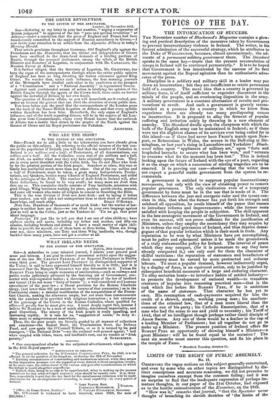TOPICS OF THE DAY.
THE INTOXICATION OF SUCCESS.
TICE November number of Blackwood's Magazine contains a glow- ing and poetical description of the measures taken by Government to prevent insurrectionary violence in Ireland. The writer, in his fervent admiration of the successful strategy, which he attributes to the Duke of WELLINGTON becomes, almost unconsciously, the ad- vocate of a permanent military government there. The Standard speaks in the same key—trusts that the present accumulation of troops in Ireland will be continued permanently.* It is to be hoped that Government is less intoxicated by the success of its first movement against the Repeal agitation than its enthusiastic advo- cates of the press. Discipline in a soldiery and military skill in a leader may put down an insurrection ; but they are insufficient so retain permanent hold of a country. The mere idea that a country is governed by military force, is of itself sufficient to engender discontent in the minds of the people, and an overbearing disposition in the army. A military government is a constant alternation of revolts and pro- vocations to revolt. And such a government is gravely recom, mended as a panacea for a country in which we know from experience there are already too many predisposing causes to insurrection. It is proposed to allay the ferment of popular suffering and irritation solely by throwing in a new element of anarchy. The Standard dwells upon the cheapness with which the bulk of the English army can be maintained in Ireland; as if there were not the slightest chance of its services ever being called for in this island—as if there had never been FROST'S march upon New- port, or Rebeccaism in Wales, the scenes in the Bull-ring at Bir- mingham, or last year's rising in*Lancashire and Yorkshire ! Black- wood relies upon "appliances of military art," upon "forts and loopholed barracks to secure what has been won,' and "retreats to overawe what for the moment has been lost." This is indeed looking upon the future of Ireland with the eye of a poet, regarding it as the stage on which a succession of stirring tragedies are to be enacted. It is proving our case—showing that the writer tines not expect a peaceful stable government from the system be re- commends.
A government is entitled to suppress popular insurrectionary movements, but only with the view of obtaining power to remove popular grievances. The only vindication even of a temporary government by force must be in the use that is made of it. The difference between the just and energetic ruler and the tyrant con- sists in this, that when the former has put forth his strength and subdued all opposition, he avails himself of the pause that ensues to introduce reforms and improvements ; while the former rests satisfied with keeping the people in subjection. The skill apparent in the late strategetic movement of the Government in Ireland, and even its success, will not prove sufficient for the justification of Ministers, unless they employ the ascendancy they may acquire by it to redress the real grievances of Ireland, and thus deprive dema- gogues of that popular irritation which is their stock in trade. Any reputation to be won by what Ministers have yet accomplished, must be paltry and ephemeral unless it be made the groundwork of a truly statesmanlike policy for Ireland. The interval of peace which they may conquer, (for it is premature to say they have already conquered it,) can only earn for them the character of skilful tacticians : the reputation of statesmen and benefactors of their country must be earned by more protracted and arduous labours. To meet a popular demand, however indiscreetly urged, by a display of force, is an equivocal action, only to be justified by subsequent beneficial measures of a large and enduring character. To allay sectarian heats—to introduce habits of settled industry— to promote the development of national wealth—to transform creatures of impulse into reasoning practical men—that is the task which lies before Sir ROBERT PEEL, if he is ambitious of the name of statesman. That character he has yet to earn. His resumption of cash-payments acquired for him the credit of a shrewd, steady, working young man ; his ameliora- tions of the criminal law, that of a man more liberal than the common run of his party ; his Catholic Emancipation, that of a man who had the sense to see and yield to necessity ; his Tariff of 1842, that of an intelligent though perhaps rather timid disciple of ADAM &urn. Any one of these would be a feather in the cap a a leading Member of Parliament ; but all together do not go to make up a Minister. The present position of Ireland offers Sir ROBERT PEEL an opportunity of showing himself a Minister—a great Minister : will he be found equal to the occasion ? The next six months must answer this question, and fix his place in the temple of Fame.
• Standard, Tuesday. October 31.


























 Previous page
Previous page